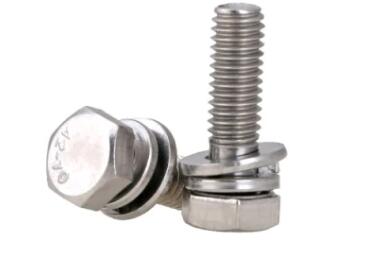What is a bolt
2023-10-31
Bolts may seem like small, unremarkable components in the world of engineering and construction, but they play a crucial role in holding everything together. These unassuming fasteners are the unsung heroes of the mechanical world, ensuring that structures stand firm, machinery operates smoothly, and vehicles stay in one piece. In this blog, we'll delve into the fascinating world of bolts, exploring their history, types, materials, and the vital role they play in various industries.
A Brief History of Bolts
The concept of bolts and threaded fasteners dates back thousands of years. The ancient Greeks and Romans used wooden dowels and threads for various applications, but the first recognizable bolts emerged during the industrial revolution. As machinery and structures became more complex, the need for standardized fasteners grew. In the mid-19th century, Whitworth threads, one of the earliest standardized thread forms, were introduced, setting the stage for the development of modern bolts.
Types of Bolts
Bolts come in a wide array of types and configurations, each designed for specific applications. Here are some common types:
1. Hex Bolts: These are perhaps the most familiar bolts, featuring a six-sided head.
2. Carriage Bolts: Recognizable by their flat, rounded head and square neck, they are often used in wood applications.
3. Lag Bolts: Ideal for heavy-duty fastening, lag bolts have coarse threads and a hex head.
4. Eye Bolts: These bolts have a loop at one end, making them perfect for attaching cables and hooks.
5. U-Bolts: U-shaped bolts with threaded ends, used for securing pipes and round objects.
6. T-Bolts: T-shaped bolts with a head designed to fit into a T-slot, common in machine tooling.
7. Anchor Bolts: These are embedded in concrete to secure structural elements.
8. Stud Bolts: Studs with threads on both ends, commonly used in flanged connections.
Materials Matter
The choice of material for a bolt is critical and depends on factors like strength, corrosion resistance, and the application. Some common bolt materials include:
1. Stainless Steel: Known for its corrosion resistance, stainless steel bolts are often used in outdoor and marine applications.
2. Carbon Steel: These are the most common bolts, used in a wide range of applications. They can be coated to enhance corrosion resistance.
3. Alloy Steel: Offering high strength, alloy steel bolts are used in demanding environments.
4. Brass: Used in applications where electrical conductivity and corrosion resistance are important.
5. Aluminum: Lightweight and corrosion-resistant, aluminum bolts find use in aerospace and construction.
6. Titanium: Known for its high strength-to-weight ratio, titanium bolts are used in aerospace, medical, and sports equipment.
The Role of Bolts in Various Industries
Bolts are the backbone of many industries:
1. Construction: Bolts hold together the structural elements of buildings and bridges, ensuring stability and safety.
2. Automotive: Your car is a complex assembly of components secured by bolts, from the engine to the chassis.
3. Aerospace: Bolts must withstand extreme conditions in aircraft, including rapid changes in temperature and pressure.
4. Manufacturing: In factories, bolts hold machinery together, enabling efficient production processes.
5. Marine: Saltwater and harsh conditions require corrosion-resistant bolts in marine applications.
The Art of Tightening
Properly torquing a bolt is a science in itself. Over-tightening can cause damage, while under-tightening may result in loose connections. Torque wrenches are essential tools for achieving the right tension.
The Future of Bolts
As engineering and materials science advance, so do the bolts. Modern manufacturing techniques and materials are leading to stronger, lighter, and more corrosion-resistant bolts. The future might bring self-monitoring bolts that can signal when they're under stress, further enhancing safety.
In conclusion, bolts are small but mighty components that are essential for the functioning and safety of our modern world. From the construction of skyscrapers to the space race, bolts have played a pivotal role, quietly ensuring that everything holds together. The next time you see a massive bridge or a sleek sports car, remember the unsung heroes – the bolts that make it all possible.



